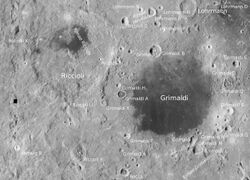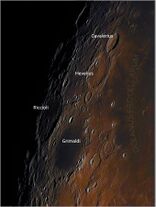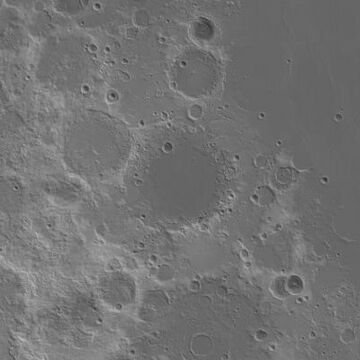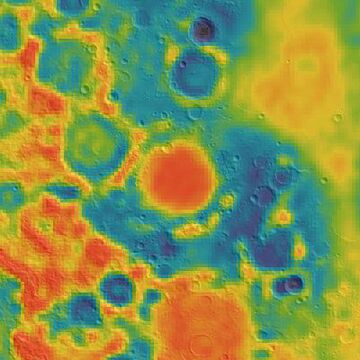Astronomy:Grimaldi (crater)
 LROC - WAC | |
| Diameter | 173.49 km[1] |
|---|---|
| Depth | 2.7 km |
| Colongitude | 67° at sunrise |
Grimaldi is a large basin located near the western limb of the Moon. It lies to the southwest of the Oceanus Procellarum, and southeast of the crater Riccioli. Between Oceanus Procellarum is Damoiseau, and to the north is Lohrmann.
The inner wall of Grimaldi has been so heavily worn and eroded by subsequent impacts that it forms a low, irregular ring of hills, ridges and peaks, rather than a typical crater rim. However, there are peaks remaining that reach heights of over 2 kilometers. The mare lava floor is the most notable feature of this crater, forming a flat, relatively smooth and featureless surface with a particularly low albedo. The dark shade of the floor contrasts with the brighter surroundings, making the crater easy to locate. The approximate diameter of the inner rim is 174 kilometers.
Beyond the basin are the scattered remnants of an outer wall, which has a diameter of 220 kilometers. This exterior rim is more intact to the north and west of the crater than elsewhere. To the southeast of Grimaldi is a system of rilles named the Rimae Grimaldi. To the northwest, rilles belonging to the Rimae Riccioli approach the western edge of Grimaldi's rim.
A mass concentration (mascon), or gravitational high, has been identified in the center of Grimaldi (corresponding with the mare). The mascon was mapped at high resolution by GRAIL.
Grimaldi has a history of transient lunar phenomena, including occasional flashes of light, color patches, and areas of hazy visibility. Gaseous emissions from this area have also been detected using spectroscopy.
Satellite craters
By convention these features are identified on lunar maps by placing the letter on the side of the crater midpoint that is closest to Grimaldi.
| Grimaldi | Latitude | Longitude | Diameter |
|---|---|---|---|
| A | 5.4° S | 71.2° W | 15 km |
| B | 2.9° S | 69.2° W | 22 km |
| C | 2.6° S | 61.5° W | 10 km |
| D | 3.7° S | 65.5° W | 22 km |
| E | 3.7° S | 64.4° W | 13 km |
| F | 4.0° S | 62.7° W | 29 km |
| G | 7.4° S | 64.9° W | 13 km |
| H | 4.9° S | 71.4° W | 9 km |
| J | 2.9° S | 70.6° W | 16 km |
| L | 8.5° S | 66.7° W | 19 km |
| M | 8.0° S | 67.0° W | 18 km |
| N | 7.6° S | 66.6° W | 8 km |
| P | 8.0° S | 68.3° W | 10 km |
| Q | 4.8° S | 64.8° W | 21 km |
| R | 8.5° S | 71.2° W | 9 km |
| S | 6.4° S | 65.0° W | 11 km |
| T | 7.7° S | 70.9° W | 12 km |
| X | 5.8° S | 72.3° W | 9 km |
References
- Andersson, L. E.; Whitaker, E. A. (1982). NASA Catalogue of Lunar Nomenclature. NASA RP-1097.
- Blue, Jennifer (July 25, 2007). "Gazetteer of Planetary Nomenclature". USGS. http://planetarynames.wr.usgs.gov/.
- Bussey, B.; Spudis, P. (2004). The Clementine Atlas of the Moon. New York: Cambridge University Press. ISBN 978-0-521-81528-4.
- Cocks, Elijah E.; Cocks, Josiah C. (1995). Who's Who on the Moon: A Biographical Dictionary of Lunar Nomenclature. Tudor Publishers. ISBN 978-0-936389-27-1. https://archive.org/details/isbn_9780936389271.
- McDowell, Jonathan (July 15, 2007). "Lunar Nomenclature". Jonathan's Space Report. http://host.planet4589.org/astro/lunar/.
- Menzel, D. H.; Minnaert, M.; Levin, B.; Dollfus, A.; Bell, B. (1971). "Report on Lunar Nomenclature by the Working Group of Commission 17 of the IAU". Space Science Reviews 12 (2): 136–186. doi:10.1007/BF00171763. Bibcode: 1971SSRv...12..136M.
- Moore, Patrick (2001). On the Moon. Sterling Publishing Co.. ISBN 978-0-304-35469-6. https://archive.org/details/patrickmooreonmo00patr.
- Price, Fred W. (1988). The Moon Observer's Handbook. Cambridge University Press. ISBN 978-0-521-33500-3.
- Rükl, Antonín (1990). Atlas of the Moon. Kalmbach Books. ISBN 978-0-913135-17-4.
- Webb, Rev. T. W. (1962). Celestial Objects for Common Telescopes (6th revised ed.). Dover. ISBN 978-0-486-20917-3. https://archive.org/details/celestialobjects00webb.
- Whitaker, Ewen A. (1999). Mapping and Naming the Moon. Cambridge University Press. ISBN 978-0-521-62248-6.
- Wlasuk, Peter T. (2000). Observing the Moon. Springer. ISBN 978-1-85233-193-1.
 |




